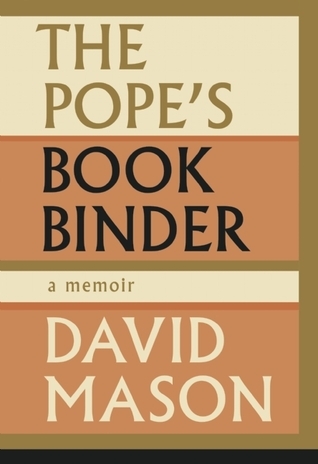
When I was in my late teens I dreamed of running a used bookstore; to someone who spent part of every weekend scanning the cracked spines of the science fiction paperbacks in Art’s Book Den, it seemed the perfect job. There was no need to search: people brought you books; you paid half what you would later sell them for; and you could read any of them for free! But that was long ago, and what some might call “common sense” prevailed.
David Mason’s memoir The Pope’s Bookbinder (Biblioasis) provides a glimpse into the life I might have led. Mason has worked in Toronto as a used and antiquarian bookseller for over four decades, beginning with a position as an assistant in a “tiny shop on Yonge, just south of Dundas … working 23 hours a week at $3.00 an hour.” Somehow or other he has managed to survive ever since, in this now-threatened business of selling used books, and The Pope’s Bookbinder is filled with anecdotes from a lifetime’s work in a career that few would choose today (a phrase from the book’s press release neatly summarizes the perils: the “huge costs, general indifference, and the disappearance of most of his colleagues”).
There is a rough chronology to events, but most of the chapters are topic-based (“Reflections on Scouting”; “Private Collectors”; “Crooks and Cranks”), which allows you to browse through The Pope’s Bookbinder according to your whims. You quickly get a sense of Mason’s personality—gruff and opinionated—but his passion and his expertise are also evident, and before long you realize that here is someone who has truly found his calling: a happy man, despite the meagre financial rewards.
The Pope’s Bookbinder reads like a message in a bottle: a transmission from another shore, a vanished time.







